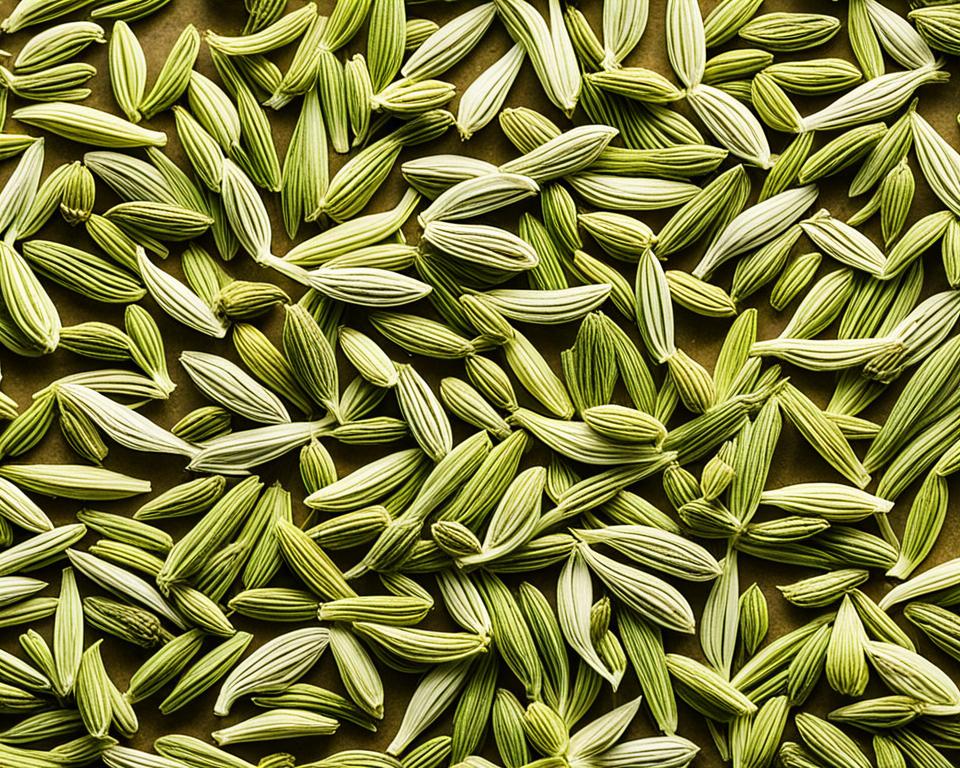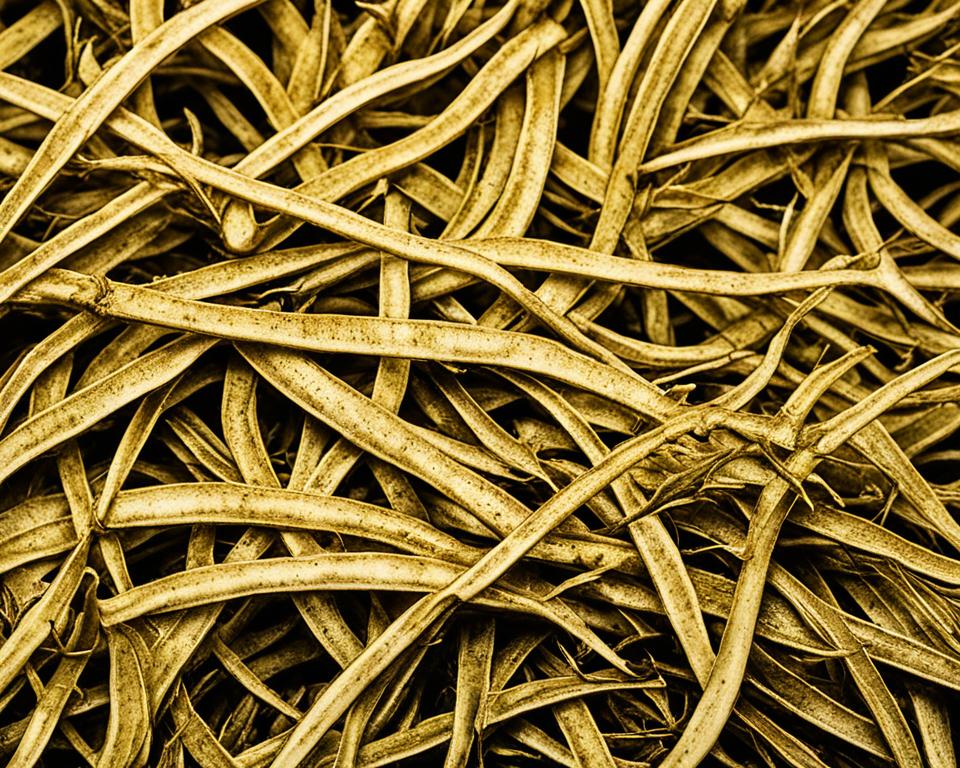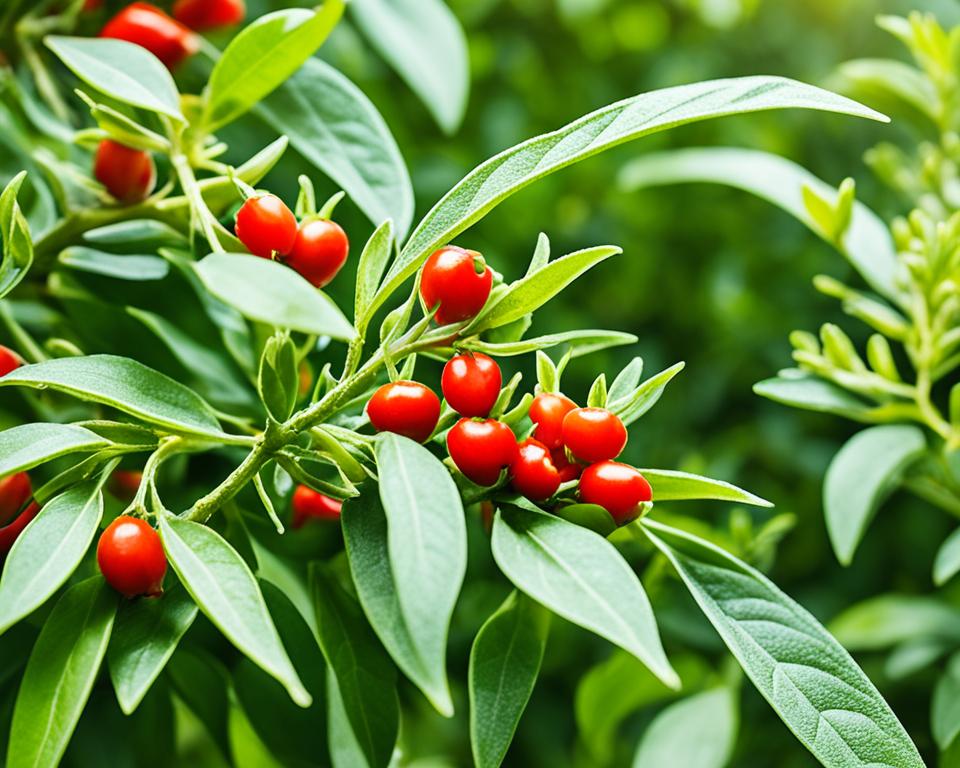Fennel seeds are a versatile and flavorful spice with a long history of use in various culinary traditions around the world. These small, oblong seeds offer a distinct licorice-like aroma and taste that can enhance a wide range of savory and sweet dishes. Beyond their culinary applications, fennel seeds are also prized for their potential health benefits, which range from aiding digestion to reducing inflammation. This comprehensive article will explore the origins, flavor profile, nutritional value, and practical uses of fennel seeds, as well as highlight their role in traditional medicine and provide a variety of recipe ideas for incorporating this unique spice into your diet.
Read interesting things at : tosawakan
Key Takeaways
- Fennel seeds are a versatile and flavorful spice with a distinctive licorice-like aroma and taste.
- Fennel seeds offer a range of potential health benefits, including aiding digestion and reducing inflammation.
- The article will explore the origins, flavor profile, nutritional value, and practical uses of fennel seeds.
- Fennel seeds have a long history of use in various culinary traditions around the world.
- The article will provide a variety of recipe ideas for incorporating fennel seeds into your diet.
What Are Fennel Seeds?
Fennel seeds are the fruit of the fennel plant (Foeniculum vulgare), a member of the carrot family. The plant is native to the Mediterranean region and has been cultivated for centuries, with its fennel seeds used as a fennel spice in various cuisines around the world. These small, elongated, and greenish-brown seeds possess a distinctive licorice-like aroma and flavor, which comes from the presence of the organic compound anethole.
Botanical Origins and Cultivation
The fennel plant thrives in warm, sunny climates and well-drained soil, and can be grown both in gardens and as a commercial crop. The plant’s ability to adapt to different growing conditions has contributed to its widespread cultivation, allowing the fennel seeds to become a staple ingredient in many regional and international culinary traditions.
The Unique Flavor Profile of Fennel Seeds
Fennel seeds are known for their unique and captivating flavor profile, which is often described as aromatic and licorice-like. This distinctive taste comes from the presence of the organic compound anethole, which is responsible for the seeds’ fennel aroma and fennel flavor.
Culinary Uses in Various Cuisines
Fennel seeds are widely used in a variety of fennel cuisine, from Indian curries and Italian sausages to Scandinavian baked goods and Middle Eastern spice blends. Their versatility allows them to complement both savory and sweet dishes, making them a valuable fennel spice addition to the spice cabinet.
Fennel Seed’s Nutritional Powerhouse
Fennel seeds are not only flavorful, but they also boast an impressive nutritional profile. They are a rich source of essential vitamins and minerals, including vitamin C, potassium, and manganese. Additionally, fennel seeds contain a variety of beneficial plant compounds, such as flavonoids and terpenes, which act as powerful antioxidants and may contribute to the spice’s potential health benefits. Regular consumption of fennel seeds can support overall well-being and provide a natural way to boost nutrient intake.
| Nutrient | Amount per 1 tbsp (6g) of Fennel Seeds |
|---|---|
| Calories | 23 |
| Carbohydrates | 5g |
| Fiber | 3g |
| Protein | 1g |
| Vitamin C | 1.2mg |
| Potassium | 31mg |
| Manganese | 0.1mg |
| Flavonoids | Quercetin, Kaempferol |
| Terpenes | Anethole, Limonene |
The impressive nutritional profile of fennel seeds, combined with their antioxidant properties, make them a valuable addition to a balanced and nutritious diet. Regular consumption of this flavorful spice can support overall well-being and provide a natural way to boost nutrient intake.
Health Benefits of Fennel Seeds
Fennel seeds have been associated with a variety of potential health benefits, making them a valuable addition to a balanced and nutritious diet. One of the most well-known benefits of fennel seeds is their ability to aid digestion and reduce bloating. The volatile oils in fennel seeds, such as anethole, have been shown to have spasmolytic (muscle-relaxing) and carminative (gas-expelling) properties, which can help alleviate digestive discomfort. Additionally, fennel seeds possess anti-inflammatory properties that may help reduce inflammation throughout the body.
Digestive Aid and Reducing Bloating
The fennel benefits for digestion and reducing bloating are well-documented. The unique compounds found in fennel seeds, such as anethole, have been demonstrated to have a soothing effect on the digestive system, helping to relax the muscles and expel excess gas. Incorporating fennel seeds into your diet can be an effective natural remedy for addressing issues like indigestion, bloating, and other gastrointestinal discomforts.
Anti-Inflammatory Properties
In addition to their digestive benefits, fennel seeds also possess anti-inflammatory properties that may help reduce inflammation throughout the body. The antioxidants and bioactive compounds present in fennel seeds have been shown to modulate the body’s inflammatory response, potentially providing relief for conditions associated with chronic inflammation, such as arthritis, asthma, and certain skin disorders.
Potential Benefits for Respiratory Health
Some research also suggests that fennel seeds may offer potential benefits for respiratory health, such as reducing the severity of asthma symptoms. The volatile oils in fennel seeds may have a soothing effect on the respiratory system, potentially helping to ease breathing difficulties and provide relief for those with respiratory ailments.
Fennel Seeds in Traditional Medicine
Fennel seeds have a long history of use in traditional medicine systems, particularly in Ayurvedic and Chinese herbal practices. These ancient medicinal traditions have recognized the potential benefits of fennel seeds and incorporated them into various remedies and holistic health practices.
Ayurvedic and Chinese Herbal Remedies
In Ayurveda, the ancient Indian system of holistic health, fennel seeds are considered a valuable digestive aid and are often used to help alleviate conditions such as indigestion, bloating, and constipation. Ayurvedic practitioners believe that fennel seeds possess a warming effect and can help restore balance within the body.
Similarly, in traditional Chinese medicine, fennel seeds are also believed to have a warming effect and are commonly used to address respiratory issues, such as cough and congestion. The traditional medicinal uses of fennel seeds in these ancient practices have contributed to their enduring popularity and continued study by modern researchers.
fennel seed
Fennel seed is the small, oblong fruit of the fennel plant (Foeniculum vulgare), a member of the carrot family. These fennel seeds have a distinctive licorice-like aroma and flavor, making them a versatile and popular fennel spice used in a variety of cuisines around the world. Fennel seeds can be used whole or ground, and they are prized for their potential health benefits as well as their culinary applications.
| Fennel Seed Traits | Description |
|---|---|
| Botanical Origins | Fennel plant (Foeniculum vulgare), a member of the carrot family |
| Flavor Profile | Distinctive licorice-like aroma and taste |
| Culinary Applications | Versatile spice used in a wide range of cuisines worldwide |
| Potential Health Benefits | Prized for their various health-promoting properties |
Fennel seed is a unique and captivating fennel spice that has been used for centuries in diverse culinary traditions. Its distinctive licorice-like flavor and aroma make it a valuable ingredient in both savory and sweet dishes, contributing depth and complexity to a wide range of recipes. Whether used whole or ground, fennel seeds are prized not only for their culinary applications but also for their potential health-promoting benefits, making them a versatile and sought-after spice.
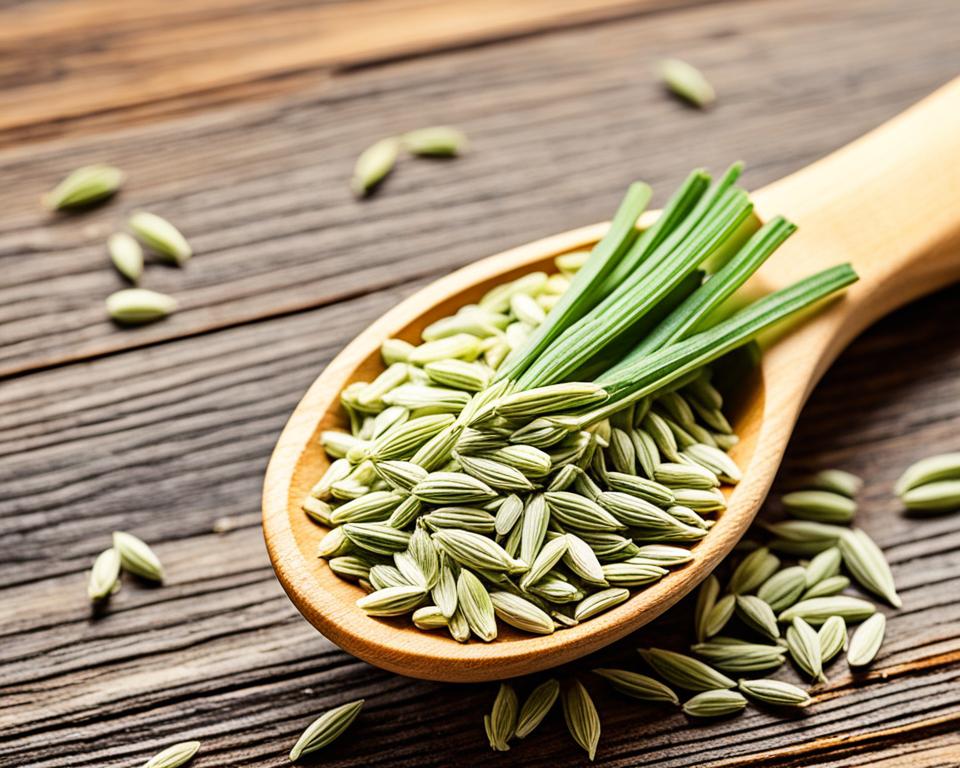
Incorporating Fennel Seeds into Your Diet
Fennel seeds can be easily incorporated into one’s diet in a variety of ways. One popular method is to brew fennel tea, which can be enjoyed on its own or as a digestive aid after meals.
Brewing Fennel Tea
To make fennel tea, simply steep the whole or crushed fennel seeds in hot water for several minutes. The aromatic, licorice-like flavor of the seeds will infuse the tea, creating a soothing and comforting beverage.
Seasoning Dishes with Fennel Seeds
Fennel seeds can also be used as a seasoning in both savory and sweet dishes, adding their distinctive flavor to everything from curries and roasted vegetables to baked goods and desserts. The seeds can be used whole, crushed, or ground, depending on the desired texture and intensity of flavor.
Fennel Seed Essential Oil
In addition to their culinary uses, fennel seeds can also be used to extract a potent fennel essential oil. Fennel seed essential oil is prized for its aromatic and therapeutic properties. The oil’s main compound, anethole, is responsible for its distinctive licorice-like aroma and flavor.
Aromatic and Therapeutic Benefits
Fennel seed essential oil has been used in aromatherapy practices to promote relaxation and alleviate digestive issues. The oil’s therapeutic benefits are believed to stem from its high concentration of anethole, which may possess spasmolytic, carminative, and anti-inflammatory properties.
Safe Usage and Precautions
When using fennel seed essential oil, it is important to follow proper safety guidelines. Overexposure or improper use can potentially cause skin irritation or other adverse reactions. It is recommended to dilute the oil before topical application and to consult with a healthcare professional, especially if you have any underlying medical conditions or are taking medications that may interact with fennel.
Growing Fennel Seeds at Home
Fennel seeds can also be grown at home, allowing you to enjoy the fresh, flavorful spice straight from your own garden.
Fennel plants thrive in warm, sunny conditions and well-drained soil. They can be grown from seed, with the best time to sow them being in the spring or early summer. When planting fennel, it’s important to provide the plants with ample space, as they can grow quite tall and bushy. Regular watering and weeding will help ensure a bountiful harvest of fennel seeds. With the right growing conditions and a little care, you can enjoy the rewards of homegrown fennel seeds.
Cultivation Requirements and Tips
To successfully grow fennel seeds at home, there are a few key requirements and tips to keep in mind. Fennel prefers full sun exposure and well-drained, nutrient-rich soil. When sowing the seeds, space them about 12-18 inches apart, as the plants can grow up to 4 feet tall. Regular watering, especially during dry spells, is essential to support the plant’s growth. Additionally, be sure to keep the area around the fennel plants weed-free, as they can compete for resources. With the right conditions and a bit of diligent care, you can look forward to a plentiful harvest of homegrown fennel seeds.
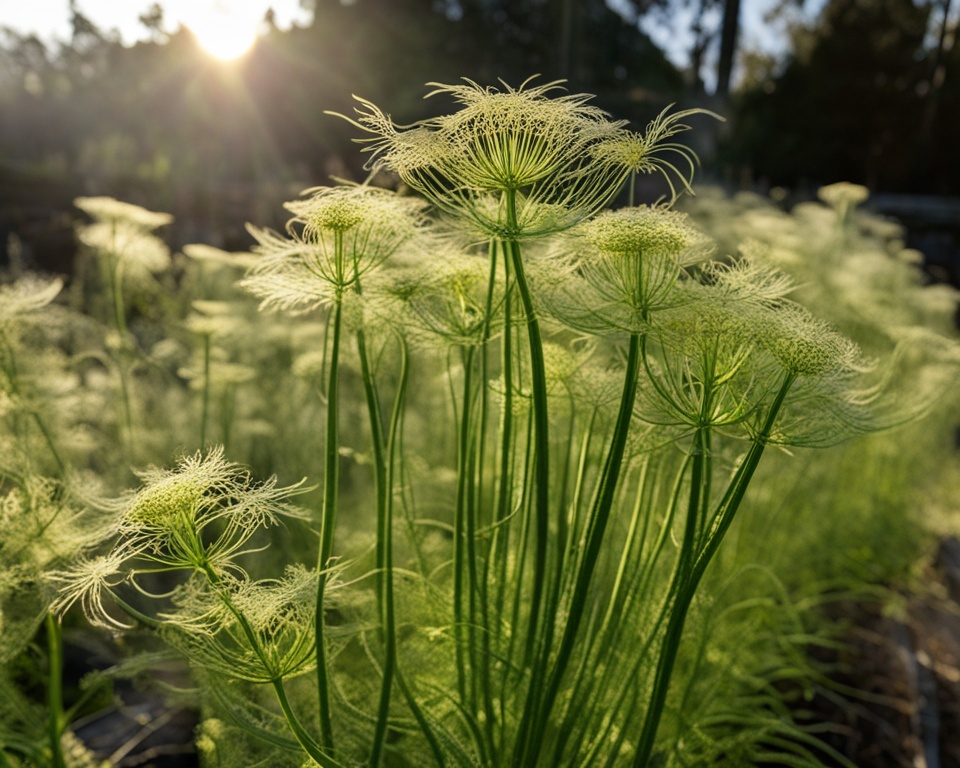
Fennel Seed Recipes and Culinary Inspirations
Fennel seeds can be incorporated into a wide range of dishes, both traditional and modern, as well as sweet and savory. In traditional cuisines, fennel seeds are commonly used in Indian curries, Italian sausages, and Scandinavian baked goods. In more contemporary recipes, fennel seeds can add depth of flavor to roasted vegetables, marinades, and even cocktails.
Sweet and Savory Recipe Ideas
For those with a sweet tooth, fennel seeds can be used to enhance baked goods like cookies, cakes, and pies, or incorporated into homemade fennel tea and infused syrups. The versatility of fennel seeds allows for endless culinary experimentation and the creation of unique and flavorful dishes.
| Traditional Fennel Seed Dishes | Modern Fennel Seed Recipes |
|---|---|
|
|
Potential Side Effects and Interactions
While fennel seeds are generally safe for consumption, it is important to be aware of potential fennel side effects and fennel interactions. In rare cases, some individuals may experience allergic reactions or digestive discomfort when consuming fennel seeds. Additionally, fennel seeds may interact with certain medications, such as blood thinners, diabetes medications, and antidepressants.
Moderation and Precautions
It is recommended to consult with a healthcare professional before consuming fennel seeds, especially in large quantities or if you have any underlying medical conditions. As with any food or supplement, fennel moderation is key when incorporating fennel seeds into your diet.
| Potential Side Effects | Possible Interactions | Safety Considerations |
|---|---|---|
| Allergic reactions | Blood thinners | Consult a healthcare professional |
| Digestive discomfort | Diabetes medications | Observe moderation when consuming |
| – | Antidepressants | Avoid large quantities |
By being mindful of potential fennel side effects and fennel interactions, and practicing fennel moderation, you can safely and responsibly enjoy the many benefits that fennel seeds have to offer.
Fennel Seeds: A Versatile and Flavorful Superfood
Fennel seeds are a truly remarkable spice that offer a unique and captivating fennel flavor profile, as well as a host of potential fennel benefits. With their aromatic, licorice-like aroma and taste, fennel seeds can elevate a wide range of savory and sweet dishes, making them a valuable addition to any cook’s spice collection. Beyond their culinary applications, fennel seeds are also a nutritional powerhouse, containing a variety of essential vitamins, minerals, and antioxidants that may support overall well-being.
Whether used in traditional recipes or incorporated into modern culinary creations, fennel seeds demonstrate their versatility as a flavorful and healthful superfood. From enhancing the depth of flavor in savory Indian curries to adding a delightful twist to Scandinavian baked goods, the fennel spice can seamlessly integrate into a wide array of culinary endeavors. Additionally, the potential health benefits associated with fennel seed consumption, such as aiding digestion and reducing inflammation, further solidify its status as a must-have ingredient in any health-conscious kitchen.
As fennel seeds continue to captivate the culinary world with their unique fennel aroma and flavor, they also stand out as a nutritional powerhouse. Rich in essential vitamins, minerals, and antioxidants, this remarkable spice offers a natural way to boost your nutrient intake and support overall well-being. Whether you’re looking to elevate your cooking or explore the potential therapeutic uses of fennel seeds, this versatile superfood is sure to leave a lasting impression on your palate and your health.
Conclusion
Fennel seeds are a remarkable and versatile spice that offer a unique licorice-like flavor and a wide range of potential health benefits. From aiding digestion and reducing inflammation to providing a rich source of essential nutrients, fennel seeds are a valuable addition to a balanced and nutritious diet.
Whether you’re looking to enhance your culinary creations, explore the therapeutic uses of fennel, or simply enjoy the aromatic and flavorful qualities of this remarkable spice, fennel seeds are well worth discovering and incorporating into your daily life. With their diverse applications and compelling health properties, fennel seeds truly deserve their place as a celebrated and sought-after superfood.
By incorporating fennel seeds into your diet, you can enjoy the unique flavor and potential benefits they offer, making them a versatile and valuable addition to your culinary and wellness repertoire.






